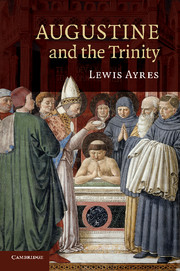Book contents
- Frontmatter
- Contents
- Acknowledgements
- List of abbreviations
- Introduction
- Part I Origins
- Part II Ascent
- 4 The unadorned Trinity
- 5 Per corporalia … ad incorporalia
- 6 A Christological epistemology
- Part III Into the mystery
- Part IV Memory, intellect and will
- Epilogue: Catching all three
- Bibliography
- Scripture index
- General index
- References
6 - A Christological epistemology
Published online by Cambridge University Press: 06 December 2010
- Frontmatter
- Contents
- Acknowledgements
- List of abbreviations
- Introduction
- Part I Origins
- Part II Ascent
- 4 The unadorned Trinity
- 5 Per corporalia … ad incorporalia
- 6 A Christological epistemology
- Part III Into the mystery
- Part IV Memory, intellect and will
- Epilogue: Catching all three
- Bibliography
- Scripture index
- General index
- References
Summary
The previous chapter suggested that Augustine's account of thinking the divine is founded on themes learnt through his encounters with Platonizing conceptions of the Liberal Arts. The present chapter takes forward my argument by showing that the initial books of the De trinitate bring Augustine's adaptation of practices for thinking the intelligible to a new focus. They do so by describing the movement of the attention and understanding necessary for interpreting Scripture's speech about Father, Son and Spirit as mirroring the process by which the incarnate Word speaks of divine realities in spatial and temporal terms. As we shall see, this relationship is not only extrinsic: Augustine views the process by which the mind moves from obsession with the material towards contemplation of the divine as a constitutive part of the purification that is salvation, and as occurring in the two-natured Christ, through participation in Christ's body.
I term Augustine's account of this movement an ‘epistemology’ because it constitutes a major part of Augustine's mature account of how God may be known. This is to use the term rather differently from its standard post-Enlightenment philosophical sense, but doing so emphasizes the extent to which Augustine presents this account of knowing as the condition of possibility for understanding what it is that Scripture teaches. This ‘epistemology’ could also be termed an anthropology insofar as it is founded on an account of the human being as a desiring rational creature set within an intelligible cosmos.
- Type
- Chapter
- Information
- Augustine and the Trinity , pp. 142 - 174Publisher: Cambridge University PressPrint publication year: 2010



